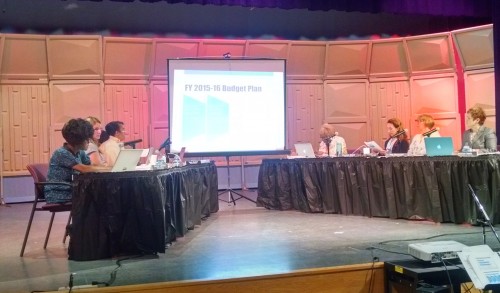
By Andrew Cluley
Communications Specialist
As the Ann Arbor School Board discusses the 2015-16 general fund budget proposal all of the usual issues are being considered, including projected revenues, fixed costs, and expenses related to new programs designed to attract students. Members of the Board of Education are also closely watching the district’s fund balance. The concern about how much the district has in reserve is both based on immediate practical budgeting reasons and concerns over legislation being discussed in Lansing.
Fund equity has been used by Ann Arbor Public Schools to maintain programming over the last decade despite declines in state funding. For instance, when the state stopped making 20 J payments Ann Arbor schools lost $233 per pupil, and fund equity was crucial in covering the loss of this revenue.
Using fund equity to balance the budget though brought down reserves that are also key to the operating budget. Fund balance was down to less than $9 million by the time Superintendent Jeanice Swift joined the district. At this level it wasn’t known if Ann Arbor Public Schools would be able to pay bills and make payroll between the start of the fiscal year and the first state aid payment in October. Swift says she quickly understood the severity of the district’s budget situation. “My first day on duty I was outside Community High School, and I signed the paperwork on the fender of a car to borrow money to make payroll,” Swift says.
No loan was needed that year, and the district is working to increase the fund balance to eliminate the concern that borrowing will be necessary in the future. At the end of this fiscal year fund balance is expected to be about $13.2 million. This is thanks to enrollment increases and in part to a one-time payment from the Washtenaw Intermediate School District for special education programming.
While the Board of Education is working to increase fund equity for stewardship purposes, early warning legislation being discussed in Lansing could require a much larger fund balance for school districts across Michigan. The proposals currently being discussed would require districts maintain a fund balance of either five percent or eight percent of the operating budget. If a district doesn’t meet this target they could lose some local control. The state would require additional budget reporting, and WISD approval of proposed budgets.
School Board President Deb Mexicotte says the concept of setting a target for reserves makes sense, but the specific proposal could hurt districts. “To set a place, whether it’s five percent, or eight percent as a guideline or as something to work toward over a period of time makes a lot of sense to me, but to actually put in penalties for those that aren’t even borrowing, yet alone in deficit seems a little draconian,” Mexicotte says.
School Board Trustees fear a requirement for budget approval will put an end to the progress that’s being made to boost enrollment. “We need to proceed very cautiously but need to continue using innovation to attract more students,” says Board member Donna Lasinski.
The 2015-16 budget proposal adds about $265,000 in fund balance, leaving the district at about 6.55 percent of the annual budget. The district would need about $5 million more to reach an 8 percent target. President Mexicotte hopes the state would give districts time to reach the target. It’s a threat looming for many districts across Michigan. Currently the average fund balance of districts across the state is just below 7.5 percent.
School Board member Andy Thomas says working to build fund balance is important right now, but remains a challenge. “It’s very difficult to build up fund equity when you’re essentially at a break-even budget. I’m concerned what will happen the next time there is an economic downturn,” Thomas says.

Be the first to comment